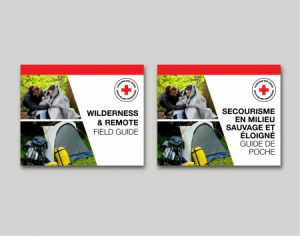Wilderness & Remote First Aid (RFA)
20 hours (3 days)
Intended for individuals who participate in life outside the immediate access of EMS, the Wilderness & Remote First Aid program of the Canadian Red Cross is an enhancement of Standard First Aid concepts to meet the demands of remote environments. Through reality-based scenarios, participants experience how and why WRFA applies a higher level of care. Beyond understanding the differences in practice between WRFA and traditional first aid, participants explore remote first aid realities and learn essential leadership, application of principled approaches, and management of environmental threats. Emphasis is on practical skills, decision making, and dealing with the outdoors.
Traditional first aid is founded on the assumption that you have easy access to emergency services and will be managing illness and injury only in the short-term. The ramifications of time and distance on the outcome of a situation in the backcountry necessitates that the responsible wilderness provider understands the differences inherent in managing care.
This course covers CSA Std Z1210-17 – Intermediate – for workplace.
Advanced Wilderness & Remote First Aid (WFA)
40 hours (4 days + evening)
Intended for individuals who lead activities outside of immediate access by EMS. More from the Wilderness & Remote First Aid program of the Canadian Red Cross .
This course covers CSA Std Z1210-17 – Advanced – for workplace. This course covers the content of the 20-hour WRFA as well as the following:
The Outdoor Leader’s Role and Responsibilities
- Leadership responsibility – Legal imparts
- Report forms
- Trip/Float/Flight plan
- Medical disclosure forms
- Client expectations
Risk Awareness and Management
- Human and environmental hazards model – case study reality
- Psychological First Aid components
Additional Medical Topics
- Tourniquet
- Rescue breathing
- Discontinuance of spinal precautions (demonstration level)
- Full-face helmet removal
- Gutts and Butts – abdominal rumble decisions
- Pressure – Altitude and Scuba
Example for a paddling group focus:
- Drowning
- Dehydration
- Dislocated fingers/shoulders
- Blisters
- Helmets
WRFA & AWRFA
Course Manual ‘NEW as of 2020
The Wilderness & Remote First Aid manual was updated from the original text developed by the Canadian Red Cross Society, Calgary, Alberta through input from across Canada. The manual has been updated to a waterproof version reference guide with colour illustrations and current WMS (Wilderness Medicine Society) protocols and practices. The field guide is on waterproof paper and is designed to go into your pack as a quick reference.
View the Page of Contents
Prepare for a Course
- Information package & course particulars
 – same info, just change the dates as needed.
– same info, just change the dates as needed. - Check out the ‘suggested’ list of what to bring.
- Be prepared to stay outdoors given the time of year. If conditions or camping ability warrants, we can stay indoors at the base.
- This will be a very active and experiential approach to learning. Come prepared with lots of physical and mental energy.
- Meals can be brought with you or you can scoot into Sackville only 5 minutes away. A small kitchen is available at the base. (Sorry, no showers though.)
- The minimum age to participate is 12 years of age – all individuals under 16 years of age must be accompanied by a registered adult.
Timing
The AWRFA course is often offered with the WRFA course by including a day that only the AWRFA participants attend.
Day 1 9:00 am – 5:00 pm (+case study – homework)
Day 2 8:00 am – overnight (camping – optional)
Day 3 8:00 am – 5:00 pm (leadership risk case study – homework)
Day 4 9:00 am – 5:00 pm (for AWRFA participants only)
Location
Unless otherwise indicated, courses take place at Halifax Search & Rescue Headquarters, 116 Lakeview Drive, Lakeview, Nova Scotia. Click here for Google Map
